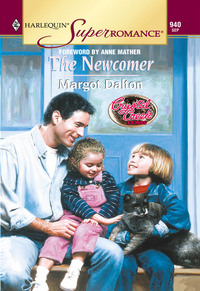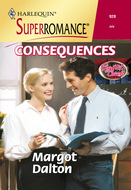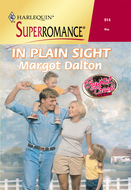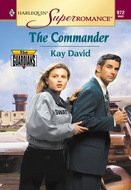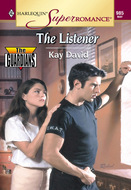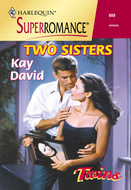Das Buch kann nicht als Datei heruntergeladen werden, kann aber in unserer App oder online auf der Website gelesen werden.
Buch lesen: "The Newcomer"
HARLEQUIN SUPERROMANCE
Celebrates its 20th Anniversary
Two decades of bringing you the very best in romance reading.
To recognize this important milestone, we’ve invited six very special authors—whose names you’re sure to recognize—to tell us how they feel about Superromance. Each title this month has a letter from one of these authors.
Although critically acclaimed author Anne Mather—whose foreword appears in this book—has never written for Superromance, she has been reading the line since it began. “It is not difficult to see why Superromances have become so successful,” she writes. “I’d recommend that anyone who is looking for a longer, exciting read give them a try. I did, and I’ve never regretted it.”
The Newcomer by Margot Dalton is a worthy addition to our anniversary lineup. Margot began writing for Superromance in 1990 and has written 22 titles for the line. In addition, she was written five mainstream novels and has contributed to several continuing series and anthologies.
In The Newcomer, readers are taken back to the town of Crystal Creek, Texas. Margot wrote seven of the original CRYSTAL CREEK series titles, and Superromance is proud to present her newest book about that friendly ranching community.
Dear Reader,
Almost ten years ago, Harlequin approached a number of authors with an exciting new idea. We were given the challenge of helping to create a central Texas town and ranching community, along with a host of exciting, heartwarming characters to populate this setting. The result was the 24-book CRYSTAL CREEK series, which has remained popular with readers since publication of the very first book in 1993.
As an author, I loved everything about writing the CRYSTAL CREEK books. So you can imagine my excitement when the Superromance editors suggested I might want to return to Crystal Creek with a new series of books. I could hardly wait! The Newcomer, the third book in this trilogy, shows what kind of tension can arise when a close-knit town is divided by the arrival of strangers. It also wraps up the stories of Bella, who appeared in the first book, and her sister Lucia, who was trying hard to save the Crystal Creek middle school in the second book of the trilogy. And it introduces Douglas Evans, a handsome, kilt-wearing Scotsman who has somehow become the mayor of a small town in Texas!
I loved making this nostalgic return to Crystal Creek. I hope you’re enjoying it as much as I did.
Warmest regards,
Margot Dalton
Other Crystal Creek titles by Margot Dalton
Harlequin Superromance
#914—IN PLAIN SIGHT
#928—CONSEQUENCES
The Newcomer
Foreword by Anne Mather
Margot Dalton
FOREWORD BY ANNE MATHER
I’ve been asked to write a brief foreword to celebrate the 20th anniversary of Harlequin Superromance, and I have to tell you, I was very flattered by the request. I have never written for Superromance myself, but I’m an enthusiastic book buyer, as well as a writer, and I have read many of the books over the years.
It’s not difficult to see why Superromances have become so successful. Harlequin has always kept a close eye on what its readers want, and when Superromances were first published, they were much longer than they are today. But, as with all new ventures, there have been obvious refinements and the line has gone from strength to strength.
I started reading Superromances at their inception, and naturally, I had my favorites. Many writers who started out with Superromance are household names today—authors like Stella Cameron, Sandra Canfield, Janice Kaiser, to name a few—and you may still be lucky enough to find their early books. I’m fortunate enough to have a collection of many of these novels, and they bear favorable comparison to what is being written today.
Of course, these days a whole new batch of authors is making their mark with Superromances. It’s a very fertile breeding ground, and I’m sure many of these writers will go on to become the household names of tomorrow. Whatever happens, I know Harlequin will support and encourage them in every way.
Because of their length, Superromances can explore character development in greater detail, and the stories reflect the lives of ordinary people—often in extraordinary situations. I’d recommend that anyone who is looking for a longer, exciting read give them a try. I did, and I’ve never regretted it.
Anne Mather
Anne Mather is a renowned and much-published author of romance and women’s fiction—one of the world’s most popular. She’s particularly well-known for her work in the Harlequin Presents series. Her distinctive stories offer intense passion and high drama—an unbeatable combination!
CONTENTS
CHAPTER ONE
CHAPTER TWO
CHAPTER THREE
CHAPTER FOUR
CHAPTER FIVE
CHAPTER SIX
CHAPTER SEVEN
CHAPTER EIGHT
CHAPTER NINE
CHAPTER TEN
CHAPTER ELEVEN
CHAPTER TWELVE
CHAPTER THIRTEEN
CHAPTER FOURTEEN
CHAPTER FIFTEEN
CHAPTER SIXTEEN
CHAPTER SEVENTEEN
CHAPTER EIGHTEEN
CHAPTER NINETEEN
CHAPTER ONE
THE CAROUSEL HORSES stood frozen in the misty chill of the February afternoon. Silver hooves pawed silently at the floorboards, dark eyes rolled wildly, while manes and tails streamed as if blown by the wind. A fitful sun broke through dark clouds above the hills, sparked fire from gold-mounted saddles and jeweled breastplates.
Lovingly, Douglas Evans caressed the blond mane of a fiery sorrel with bared yellow teeth, then knelt to examine a splintered board on the floor near the big tiger, whose jaws were drawn back in a menacing snarl.
The tiger had been discovered wrapped under layers of oilcloth in June Pollock’s cellar, more than sixty years after the dismantling of the Crystal Creek carousel. Unlike many of the other animals, this one had hardly needed any restoration. Its broad striped back was worn smooth from the thousands of tiny riders who’d sat on him, wide-eyed and awed at their own daring, as the tiger paced slowly around the carousel platform.
“Unca Dougie,” a small voice called from somewhere outside the carousel enclosure. “I’m cold.”
“Put your brush down, Robin, and come up here,” Doug said.
His rich Scottish brogue sounded loud and a little intrusive, even to his own ears, on this silent winter afternoon in the Hill Country of central Texas.
He smiled as his niece plodded up the carousel steps and tumbled at his feet in a bright plaid jacket and hood. She lay on her back and waved her green running shoes in the air.
Robin was four years old, a plump, happy little girl with golden curls, red cheeks and an irrepressible personality, as different from her older sister Moira as two children could possibly be. Doug loved his young nieces as if they were his own children, and spent a good deal of time worrying about them.
Especially nowadays…
Hiding his frown of concern, he bent and lifted Robin into his arms. Then he sat on the bench next to the tiger and cuddled the child, making a great show of putting his big hands over her ears and rubbing her cold cheeks.
She squirmed and giggled, forgetting her complaints, then settled contentedly against his denim jacket and looked around at the carousel. With a surreptitious glance at her uncle, Robin jammed her thumb in her mouth and began sucking it thoughtfully.
Doug gently removed the thumb and kissed her bright hair. She made no objection, just nestled more cozily in his arms.
“Tell me again about all the horses and stuff,” she commanded.
Doug settled back and extended his long legs in blue jeans and heavy work boots.
“Well, this carousel is the most wonderful thing,” he told the little girl, his burr becoming more pronounced, as it always did when he told stories to his nieces. “And the animals are verra, verra old.”
“How old?”
“Almost a hundred years.”
“Older than Mummy, then.”
Doug chuckled. “Yes, my sweetheart, much older than Mummy. These fifty-four horses, and the lion and tiger and giraffe were hand-carved, every single one of them, by a man called Franz Koning who lived in Germany. For many years the carousel was one of this town’s proudest possessions. But in the Great Depression, Crystal Creek lost its carousel,” he said sadly.
Robin frowned with anxiety, which she always did at this point in her uncle’s story.
“What happened?”
Doug cuddled the child, and reached over to stroke the tiger’s glossy head. “It was broken up and sold, piece by piece, to the highest bidders. The horses and all these other animals were scattered all over the world.”
“How did they get back here, Unca?”
“A very rich, very kind man found all the parts of the carousel, and paid a lot of money to have them restored to their former glory. Then he presented them as a gift to the town of Crystal Creek. This carousel is a symbol, my chickie.”
Doug nuzzled her hair again. Robin was warm and heavy in his arms; he could tell she was getting sleepy.
“Symbol?” she asked, her eyelids fluttering drowsily.
“It stands for the pride of the town.” Doug looked with satisfaction at the bright carousel in its enclosure on the lawn in front of the courthouse. “This is the jewel in our lapel, my darling. It shows that Crystal Creek has pride in itself and its history, and will always be a fine town to live in.”
But Robin was asleep by now, slumping against his chest.
Carefully Doug made a nest for her on the bench, using his jacket to wrap her against the chill and taking care to cover her little shoes with the sheepskin-lined denim.
He bent to kiss her again, then went down the steps and around a corner to find his older niece working doggedly, applying a coat of green stain to the lower portion of the carousel enclosure beneath tall Plexiglas windows.
Doug looked with fondness at the child.
Moira was nine years old, a timid, serious little girl with big gray eyes, straight blond hair cut in a Dutch bob and a thin body in blue jeans and a parka.
The girl had a quaintly old-fashioned air about her, as if she should be sitting in some Victorian nursery, dressed in a pinafore and buttoned boots, doing her sums and letters on a slate. Moira was always quiet and self-contained, with little of the pushing or shouting common to most children her age, and none of her younger sister’s cheerful ebullience.
Poor Moira carried the weight of the world on her shoulders, Doug thought with sympathy, picking up a brush to join her. And narrow, fragile shoulders they were, too.
“Robin fell asleep,” he reported.
“Where is she?” Moira looked around in concern. Taking care of her impulsive younger sister was one of her responsibilities.
He gestured over his shoulder. “She’s curled up on the bench next to the tiger.”
“Is she warm enough?” Frowning, Moira dipped her brush carefully and squeezed excess stain onto the edge of the bucket.
Doug chuckled and reached out to touch his niece’s shining cap of hair.
“Nine years old, but going on twenty-nine, you are,” he said teasingly. “Take care of us all, don’t you, Pumpkin?”
She smiled a little, then drew back tactfully from his hand. Unlike her sister, Moira disliked being touched or cuddled.
They worked in silence for a while. Doug, always sensitive to her moods, could tell something was bothering the child.
“So, Moira.” He carried the pail of stain around on the grass and knelt to paint a new section. “What is it, then?”
She looked away from him, biting her lip. Doug studied the vulnerable line of his niece’s neck, the pale curve of her little freckled cheek.
“Mummy cried last night,” she said at last, her face still averted.
Doug’s heart sank but he kept his voice deliberately casual. “Did she, now?”
Moira nodded, concentrating on painting a lower row of boards with extreme care.
“Well,” Doug said with false heartiness, “as I understand it, ladies cry quite often. When they’re upset, it makes them feel better.”
Moira cast her uncle a skeptical glance. “How do you know about ladies? You’ve never even been married, and you’re older than Mummy.”
He threw back his head and laughed. “Indeed I am. In fact, I’m thirty-five years old and no wife anywhere in sight. But I’ve known a few ladies in my time, Moira dear, and they all seem to cry sooner or later.”
She kept her face turned away, but he could see her lower lip quivering. “Mummy cries a lot, Uncle Doug. She’s really worried.”
Doug set the brush down. For the second time that afternoon, he picked up a child in his arms. He sat on the steps of the carousel, cradling this older niece who almost never allowed herself to be held.
“Yes, Mummy has some problems,” he whispered into Moira’s silky hair. “But you mustn’t worry, dear. They’ll get worked out.”
Thoughtfully he gazed across the quiet streets, the church steeple and withered grass, the rolling hills that turned from blue to mauve to pale gray in the distance.
“Everything will work out,” he said.
Moira twisted on his lap to give him a tearful, questioning glance.
“How do you know for sure? Just because you’re the mayor?”
Doug laughed. “Oh, my sweetheart, I wish being the mayor of Crystal Creek gave me enough power to wave a magic wand and fix everybody’s troubles.”
“Maybe the magic lady will fix everything,” Moira suggested.
“What magic lady?”
“You know.” Moira glared at him impatiently. “The magic lady who drives around in her big car and looks at everything.”
“Oh, no. Not that again,” Doug said with a mock groan.
“Tell me about her, right from the start,” Moira commanded.
Her uncle sighed. By now he was weary of the story he’d made up to entertain his nieces, but the children still loved to hear it.
“Well, I saw her again this past week, lovey,” he said, squinting at the horizon.
“What did she look like?” Moira asked. “What was she doing?”
“She was a woman as lovely as a picture, Moira, in a big yellow Mercedes with California license plates. Doing the very same thing she’s been doing for months—driving around very slowly and looking at our town.”
“And from the very first time you saw her, you knew…” Moira prompted.
“I knew that huge changes were coming for Crystal Creek,” he said obediently.
“But will the changes make Mummy stop crying at night?”
Doug’s smile faded, and he hugged the child closer. “Your mother’s problems are separate from the troubles of our town, my darling. But perhaps the magic lady will work everything out at the same time.”
Moira wriggled from his grasp and stood erect, staring at the carousel with narrowed eyes. “I don’t believe in the magic lady anymore,” she said. “Nobody’s seen her except you. I think you just made her up to have a story for Robin and me.”
Doug thought about the big yellow car he’d first seen a few months ago, gliding silently past the hotel in the autumn sunlight.
And the beautiful dark-haired woman who sat at the wheel of the Mercedes, piloting her golden vehicle through the streets and avenues of Crystal Creek.
She’d looked around at his town with such intent, concentrated interest. And when she turned away, her profile was as finely sculpted as Waterford crystal.
“No,” he told the child, falling into a soft brogue as he remembered. “I didna imagine her, my lassie.”
“And she’ll make everything better?”
“Ah, yes,” Doug said with a hearty optimism he didn’t feel. “One day soon our princess will reveal her plan, and we will all be verra, verra glad to hear it.”
“You’re crazy, Uncle Doug.” Moira scrambled from his embrace and picked up her brush again. But she seemed a little reassured, and her face wasn’t quite as tense.
Doug grinned and followed her down the steps to replace the lid on his bucket of stain.
“Let’s go back for our scones and tea,” he said. “You bring the paint cans and brush, and I’ll carry that lumping great sister of yours.”
While Moira collected the supplies, Doug lifted the sleeping Robin into his arms, still warmly wrapped in the denim jacket. They started up the street toward the Crystal Creek Hotel, a bright little procession in the silent winter afternoon, Doug making a conscious effort to slow his long strides so Moira could keep up.
“Do you like it better here than in Scotland?” she asked, trotting along at his side.
“Much better,” Doug said briefly, glancing down at the child. “And how about you?”
“It rains all the time in Scotland. And the cities aren’t clean like this.”
“Exactly right, my pet.” Doug grinned at his niece. “The weather is generally a lot better in Texas, even if it does get far too hot in the summer for any sane man to enjoy.”
“But do you ever get homesick for Scotland?” Moira asked.
He thought it over. “Sometimes, but not for long. And you know what? As soon as I go back for a visit, I remember why I’m so fond of Texas.”
“Mummy and Robin and I have never gone back there for a visit,” Moira said.
“You girls and your mother only arrived a year ago,” Doug said. “And Mummy’s afraid that if you went home—” He fell abruptly silent, but Moira picked up on what he’d been about to say.
“She’s afraid they wouldn’t let us come back,” the child said. “That’s why Mummy cries at night, isn’t it? Because we might have to leave Texas.”
“Citizenship issues are too big a problem for a wee girl like you to worry about,” Doug said. “You mustn’t let it bother you, Moira.”
“But why won’t they let us stay?”
“The immigration laws are very strict,” he said. “Even more strict than when I moved here six years ago. Your mother brought you over to visit me, and then decided she wanted to stay. But the government still thinks you’re all just visiting.”
Moira’s small face grew pale. “So Mummy and Robin and I will have to leave here and go back to Scotland?”
“Not if we can help it,” Doug said. “I’m still trying to get things fixed up.”
“I don’t want to go back there,” Moira said gloomily.
Doug gave her a thoughtful glance. “But in Scotland you lived in a fine big house, and here your Mummy just has a little cottage.”
“I hated that big house,” Moira said with passion. “Every one of us hated it. The bedrooms were cold all the time.”
“I suppose they were.” Doug thought about the stately old home that his sister, Rose, had inherited from their mother. “A lovely place, that house, but not exactly cozy.”
“So what do you like the best about Texas?” Moira asked.
He thought it over. “The fact that Rory McLeod’s not here.” he said at last.
“Do you hate him, Uncle Doug?”
Doug shook his head, thinking about his mother’s second husband.
Stephen Evans, his father, had been a cultured, soft-spoken man, and much loved. But Stephen had died when Doug was nine and Rose was little more than a baby, leaving their mother a valuable whiskey distillery in the Scottish Lowlands.
A few years later she’d married McLeod, a hulking, overbearing foreman at the plant who’d soon insinuated himself into his wife’s inheritance. After college Doug had also gone to work in the family business, mostly to protect his mother’s property.
But his stepfather had always been a hard man to endure…
“No,” he said at last. “I don’t hate anybody, Pumpkin. But I’m just as happy to have an ocean between me and Rory McLeod.”
In fact, Doug had come to Texas six years earlier to set up a distributorship in the Hill Country for the family business. But his heart had no longer been in the work. The spring before his trip to America, their gentle mother had succumbed to breast cancer, and except for Rose and the girls, Doug had nothing holding him to Scotland anymore.
Something about the town of Crystal Creek had drawn him with passionate, irresistible force. Doug stayed a whole month longer than necessary, and afterward he went home only long enough to sell his share of the business, pack his belongings and begin the long battle to obtain a green card.
Now Doug owned the Crystal Creek Hotel, was mayor of the town, ran the real estate office and served as a stockbroker for local investors. Sometimes he felt as if his roots had already grown deeper into Texas soil than they’d ever been in the home of his ancestors.
“But why do you like it here so much?” Moira persisted with characteristic doggedness.
“Texas is almost ten times bigger than Scotland.” Doug shifted the burden of the sleeping child in his arms. “But it has only twice the population. And the sunshine warms me clear to the bones, Moira. I love this place.”
He gazed off at the rolling hills with their scattering of trees and rimrock outcroppings that sometimes reminded him of his homeland, especially on these blue, misty winter days.
“You know Mr. Wall, in the drugstore?” Moira gave her uncle a worried glance. “Mr. Wall says Crystal Creek is dying.”
“Does he now?” Doug said grimly.
“Yesterday Robin and I were in the store buying Gummi Bears, and he said I should tell you that half the people in the town will pack up and leave this year if they can’t get their taxes lowered.”
Doug, who was normally an easygoing man, felt a surge of real anger when he thought about the fat, gossipy druggist using children to carry his messages.
“Well, if Mr. Wall says something like that to you in future,” he told the girl, trying to keep his voice casual, “maybe you could suggest, my darling, that he might want to bring his concerns to me instead of telling them to a nine-year-old child.”
“I don’t like him.” Moira grimaced and scuffed her toe on the sidewalk. “Mr. Wall smiles all the time, but I think he’s mean.”
“Never trust a man who smiles too much,” Doug said. “Often they’re—”
He stopped abruptly, clutching Robin tightly in his arms.
“What’s the matter?” Moira asked, squinting up at her uncle.
Doug stared at the sandstone bulk of the Crystal Creek Hotel, a building on which he’d lavished a great deal of money and hard work since his arrival. The hotel’s facade glistened in the afternoon sunlight, its windows flaring gold against the darkening sky to the east. The freshly painted sign above the lobby entrance was as bright as a new coin, and all the windows shone.
A sleek yellow Mercedes was parked on the street in front of the hotel.
“Is it her?” Moira breathed, standing tensely at his side and staring along with him. “Do you think it’s the magic lady?”
“I believe it is.” Doug knew the reaction was absurd, but he felt his heart beginning to pound with excitement against his rib cage. “You know, sweetie, I do believe it is.”
“What does she want?”
He began to walk again, forgetting all about adjusting his pace to Moira’s. She puffed along at his side, looking up at him anxiously.
“Why is she here, Uncle Doug?”
“We’ll soon know, won’t we, Pumpkin?” Doug mounted the wide brick steps of the hotel and entered the lobby with the little girls, pausing to let his eyes adjust to the lack of sunlight.
Since her arrival the previous spring, Rose had worked along with Doug to redecorate the hotel’s interior. Now the old brasses shone, the woodwork gleamed with a satiny finish and chintz brightened the windows and the lobby furniture. The place had a rustic charm that drew guests from all over the Hill Country and beyond, making the Crystal Creek Hotel one of the few really thriving businesses in town.
On the back of a chintz sofa near the window, a big tabby cat drowsed lazily in the sun. She belonged to Doug and was named Dundee. Though he’d acquired her from June Pollock just a few years earlier, this plump female continued a long line of “Dundees” that stretched all the way back to his boyhood in Scotland.
But nothing in the lobby registered on its owner’s mind at this moment. Doug’s eyes were fixed on the scene at the reception desk, where Rose perched on a high stool behind the polished wooden counter, appearing so worried that Doug felt a stirring of protective concern.
Rose looked exactly like their mother, and a lot like little Moira. His sister was a small, dainty woman with fine blond hair and big blue eyes that often seemed anxious and frightened. She wore a blue sweater over a plaid shirt, and chewed the end of a pencil, gazing in distraught fashion at the hotel register.
Two people stood in front of Rose at the desk, surrounded by a small mountain of expensive-looking luggage. One of them was a handsome young blond man in khakis and a battered leather jacket. The other was Moira’s “magic lady”—the dark-haired driver of the yellow car.
The sight of them was confusing to Doug, rendering him temporarily speechless. Every time he’d seen the mysterious young woman she’d been alone. Somehow he’d never associated her with a man. He felt a sharp pang which he realized was disappointment.
But of course, that was ridiculous…
“They want a two-bedroom suite for an extended period of time.” Rose turned to her brother with obvious relief. “But they need all kinds of telephone outlets, too. I told them we only have the…”
Doug placed Robin carefully on one of the sofas by the old rock fireplace, then turned to face the group at the desk.
“We can give them the gold rooms on the second floor,” he said to Rose.
Rose smiled and handed him a key.
“It’s not exactly a suite,” Doug told the guests, “but the two adjoining bedrooms have doors that lead to a common sitting room.”
“Sounds perfect.” The young man gave Rose an engaging smile. “Don’t worry, ma’am, adjoining rooms will suit us just fine.”
Rose’s shy, delicate face turned an even deeper shade of pink. “This is my brother,” she said, her Scottish burr very pronounced. “He’s Douglas Evans, the proprietor of the hotel. Dougie, this is Margaret and Terence Embree, from Los Angeles.”
“Terry,” the young man said, coming forward to shake Doug’s hand. “Nobody ever calls me Terence.”
Doug pocketed the key and shook the man’s hand, liking the firm grasp, then turned to greet the woman who approached.
In spite of himself, she took his breath away. Up close she seemed even lovelier than all those times he’d seen her behind the wheel of her car.
She was tall and graceful, wearing leather boots and a long woolen skirt and matching jacket in pale taupe. Her face was finely sculpted, with high cheekbones and big dark eyes. A golden drift of freckles across the bridge of her nose added a touch of boyishness, an appealing contrast that seemed to heighten rather than diminish her elegance.
Her hair was long and dark, carelessly swept up and held at the back of her head by a big tortoiseshell clip. Doug studied the clip when she turned to glance at the sleeping child on the couch.
So tempting, he thought. A man would only have to reach out and unfasten that clip, and her hair would tumble down onto her shoulders in a rich, glistening mass…
He drew himself up with a guilty start.
What thoughts to be having about a woman whose husband was standing not ten feet away, he chided himself.
“Mr. Evans,” she said. Her voice was like honey warmed in the sun, sweet and husky. “I’m glad to meet you. Terry and I are planning to stay for quite some time in your hotel. We’ll need to make immediate arrangements to get a computer modem and fax machine installed in our room.”
She extended her hand and Doug took it, his whole body thrilling at the touch.
What was there about a woman that could make her very skin seem electric? Her hand was firm and slender, and he could have held it forever.
“A fax machine?” he repeated, still a little dazed. “Computer modems? That’s going to require some thought, Ms. Embree. Our rooms don’t even have phones.”
Her eyes weren’t as dark as he’d first thought, but heavily shaded by dense eyelashes. Her irises were exactly the color of those sunny backwaters in the Claro River where the water ran brown and cool over mossy stones. They gleamed with intelligence, and Doug could happily have drowned in them.
“Call me Maggie,” she said, then smiled down at Moira who stood watching her with awestruck solemnity.
As he shook Margaret Embree’s hand and gazed into that lovely face, Douglas Evans wondered if maybe the little girls were right after all.
Maybe this woman was magic.
Die kostenlose Leseprobe ist beendet.

